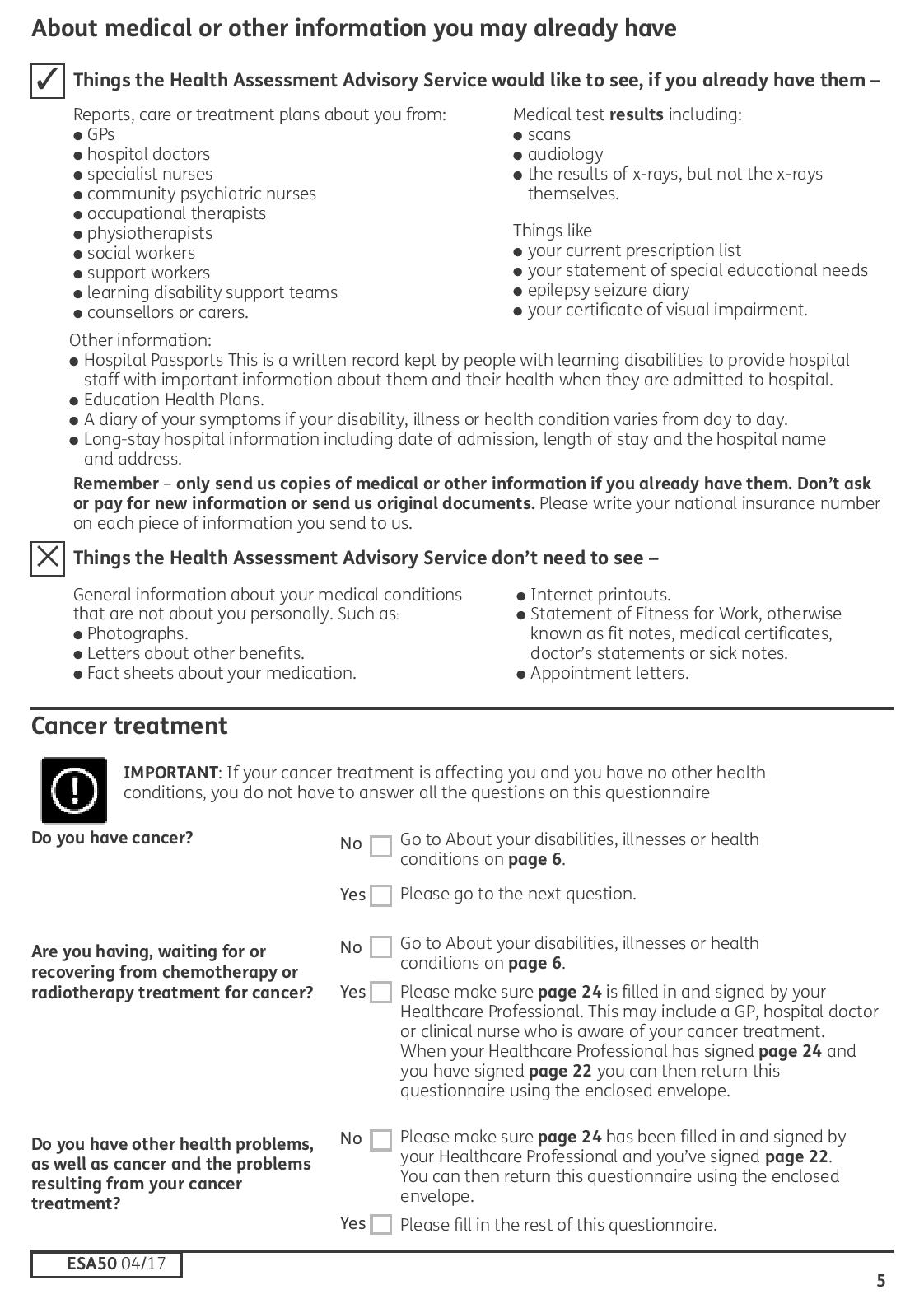Medical evidence
This advice applies to Scotland. See advice for See advice for England, See advice for Northern Ireland, See advice for Wales
You can send medical evidence of your illness or disability along with your capability for work questionnaire (ESA50 form). Medical evidence can give the DWP a better idea of how your condition affects your ability to work. It’s easy to miss this on the form itself.
If you’re including medical evidence, staple it to the form. Make sure you include your name and National Insurance number on every separate sheet of paper.
Medical evidence is on page 5 of the form - see what it looks like

If your condition is diagnosed, you’ll probably have evidence already. You can also get more if you need to, for example a letter from your consultant explaining how your condition affects you (what you can or can’t do because of it).
If your condition is undiagnosed, you’ll need to find a way to show how it affects your ability to work.
You may have to pay for medical evidence. Some evidence won’t be relevant so might not help your claim. Get help from your local Citizens Advice - they’ll help you decide what evidence to include with your ESA50 claim form.
If your condition is diagnosed
If you aren't expected to live more than a year
The easiest way to show you have a terminal illness is to ask your GP or another doctor or consultant to fill in a form - it's called an 'SR1' or a ‘DS1500’. This form gives the DWP evidence about your illness and treatment.
Tell the DWP if you can’t get a form. Use the contact details on any ESA letters you’ve received. They’ll still be able to look at your claim without the form, but they might need other information from you.
You should send evidence if it supports what you’re saying on the form. You may already have it to hand - for example:
a print-out of the medication you’re on
x-ray results
scans
a hospital discharge sheet
an occupational therapist’s care plan
If you have problems with your mental health (such as depression), you should think about any documents or letters you have from people like:
your community psychiatric nurse (CPN)
your occupational therapist - for example a care plan
counsellors
a cognitive therapist
social workers
It might be worth getting new medical evidence, for example if:
you have a new illness or disability
your illness or disability has got worse recently and you don’t have anything to prove that
you've had surgery or treatment and you have side effects
your medication was changed recently
you’ve recently been referred to a specialist or consultant
If your condition is undiagnosed
The form says “don’t ask or pay for new information”, but it might be a good idea to get medical evidence if your illness or disability is undiagnosed.
For example, you might have unexplained symptoms like stomach problems, tiredness or dizziness - and a letter from your doctor might help to explain the situation and how it affects your ability to work.
Getting new medical evidence
Some doctors might charge you for a letter or new report. If you can't afford to pay it's worth asking for copies of recent medical notes or letters from any specialists they've referred you to - they usually have to give you copies for free. You could also provide a letter from your partner or carer.
It’s a good idea to contact your nearest Citizens Advice for help and support. Someone from your local Citizens Advice should be able to:
tell you whether it’s worth getting medical evidence, for example a doctor’s letter
help you actually get hold of the evidence - and make sure it’s the right evidence for your claim
look at the medical evidence and decide whether to send it to the DWP - some medical evidence will not be relevant and so might not help your claim
The DWP look for very specific things in medical evidence, and Citizens Advice has lots of experience in this area.
Sending medical evidence after you've sent your capability for work questionnaire
It’s never too late to send medical evidence - you must send the questionnaire itself back within 28 days, but you can send evidence any time afterwards. Remember to send it to the Health Assessment Advisory Service, not to Jobcentre Plus. You can get the address of your local Health Assessment Advisory Service by calling 0800 288 8777 for free or you can find the address on their website.
Write a covering letter
It’s important to write a covering letter if you send medical evidence after you’ve sent back your questionnaire.
You should include:
your name
your National Insurance number
a note to say that the evidence supports your ESA claim - include the date you sent your questionnaire
Next steps
Page last reviewed on 07 April 2020